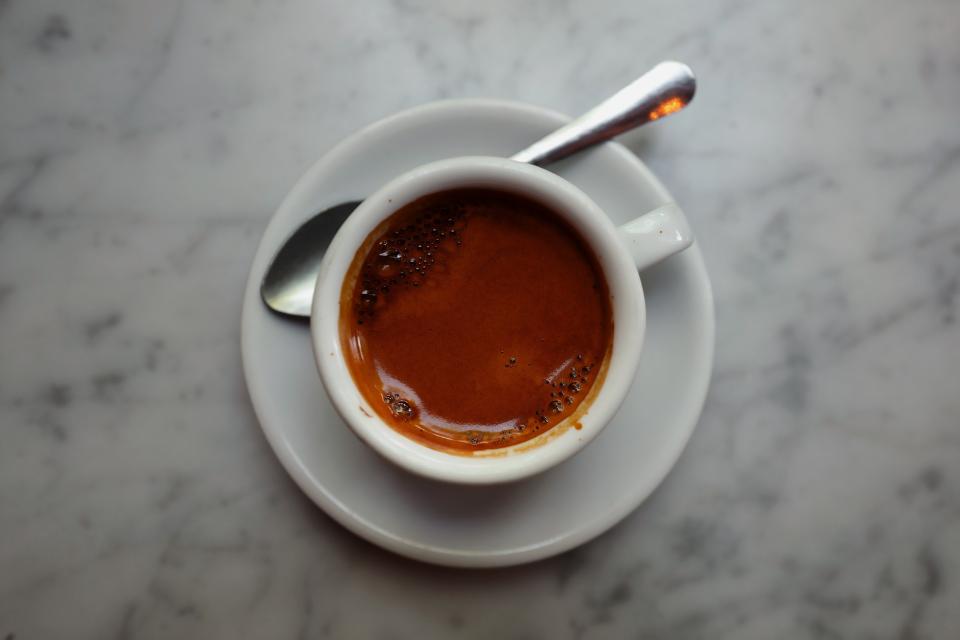Congo Fine Coffee-- A promising Future Star

For professional baristas, please follow the coffee workshop (Wechat official account cafe_style)
Congo's Specialty Brews Look to Be the & # 39TX Future of Coffee'
Linda Mugaruka perched her nose above a steaming cup of coffee. Swilling and then spitting, she noted that it was clean and sweet with traces of fruit. On her clipboard she scrawled 94, a high score for a specialty coffee.
Mugaruka, 24, is one of a few cuppers, or coffee tasters, from the eastern part of the Democratic Republic of Congo and the only wom an working as a cupper in the region. This spring, flanked by connoisseurs from South Korea and the United States, she stood over some of the most coveted cups of special ty coffee from her homeland at the nation's fledgling annual coffee festival, held here in the eastern city of Bukavu.
Linda. Mugaruka put his nose on a steaming cup of coffee. She took a gulp and then spit it out. She found the coffee refreshing, sweet and fruity. She scribbled 94 on the clipboard, which was a high score for fine coffee.
Mugaruka, 24, is one of several coffee cup testers (or coffee product reviewers) from the eastern Democratic Republic of the Congo and the only women's cup tester in the region. This spring, Congo's first annual coffee festival was held here in the eastern city of Bukavu, where she oversaw the production of some of the most coveted cups of boutique coffee from her hometown, surrounded by South Korean and American connoisseurs.
Congolese boutique coffee has great potential.
At the gathering, called the Saveur du Kivu, or Flavor of Kivu, cuppers sought to discover new flavors from a nation troubled by con flict and political instability, yet believed to be one of Africa's most promising producers of specialty coffee, with the potential to be one of the world's biggest producers of commercial-grade coffee as well.
Coffee was once Congo's second-biggest export, after copper, contributing an estimated $164million to the nation's economic output in the. But during recent decades of conflict, exports dropped drastically.
At the party called Kivu Flavor, the barista tried to find a new flavor. Congo is a country beset by conflict and political unrest, but it is also believed to be one of the most promising boutique coffee producers in Africa and has the potential to become one of the largest producers of commercial grade coffee in the world.
Coffee used to be Congo's second largest export after copper, contributing about $164 million to the country's economic output in the 1980s. But coffee exports have plummeted in recent decades because of conflicts.
Now, with millions of dollars in donor funding in recent years to build the coffee industry and help stabilize the region, coffee ex ports have steadily increased and farming cooperatives are attracting the attention of global buyers like Starbucks and the Israeli company Strauss. This is despite an overall economic crisis in Congo, political turmoil over President Joseph Kabila's refusal to step down at the e nd of his term and violence including atrocities carried out by a government-linked militia that were cited by the United Nations.
During the first half of the 20th century, as the country was subjected to exploitative Belgian rule, extensive coffee plantations rolled through the green hills of eastern Congo. The country's beans were roasted in coffee houses in Brussels and Rome, and its coffee was among the world's finest.
The coffee industry was decimated after rebel groups marched through those fields in the aftermath of the Rwandan genocide in 1994 and the toppling of Congo's long-standing dictator, Mobutu Sese Seko, in 1997.
Now, with millions of dollars donated in recent years to build the coffee industry and promote regional stability, coffee exports have grown steadily. The country's agricultural cooperatives are also starting to attract the attention of global buyers such as Starbucks and Israel's Strauss. Despite the full-scale economic crisis in Congo during this period, President Joseph. Kabiyra's refusal to step down has triggered political unrest and a wide range of violence, including atrocities by militias denounced by the United Nations, who are linked to the government.
In the first half of the 20th century, when Congo was still subject to Belgian exploitation, continuous coffee plantations spread all over the green hills of eastern Congo. The country's coffee beans are roasted in cafes in Brussels and Rome, and Congolese coffee is the world's top coffee.
After the genocide in Luanda in 1994 and the overthrow of Congo's longtime dictator Mobutu in 1997, rebel groups passed through the woodlands and the coffee industry was destroyed.
Important Notice :
前街咖啡 FrontStreet Coffee has moved to new addredd:
FrontStreet Coffee Address: 315,Donghua East Road,GuangZhou
Tel:020 38364473
- Prev

Chinese medicine practitioners talk about the pros and cons of coffee, long-term coffee drinkers should see!
Professional barista communication Please pay attention to the coffee workshop (Wechat official account cafe_style) many professionals like to drink coffee, not only because it refreshes, but also because it is delicious, of course, coffee has many advantages and disadvantages, the most important thing is to make rational use of coffee, if you like coffee, be sure to pay attention to the advantages and disadvantages of drinking coffee, traditional Chinese medicine doctors talk about coffee
- Next

What are you drinking coffee for? In order to hypnotize yourself or pretend to be Wenqing?
Professional barista communication Please pay attention to the coffee workshop (Wechat official account cafe_style) is living in our city is too busy, sleep no matter how to catch up, you must hypnotize yourself with caffeine "my good spirit"? Or in the boring daily, to the cafe cup latte dressed as Wenqing, to create a sense of romance for life? Needless to say, 90% of the words of female stars are to eliminate edema (laughter).
Related
- What grade does Jamaica Blue Mountain No. 1 coffee belong to and how to drink it better? What is the highest grade of Blue Mountain coffee for coffee aristocrats?
- What are the flavor characteristics of the world-famous coffee Blue Mountain No. 1 Golden Mantelin? What are the characteristics of deep-roasted bitter coffee?
- Can I make coffee a second time in an Italian hand-brewed mocha pot? Why can't coffee be brewed several times like tea leaves?
- Hand-brewed coffee flows with a knife and a tornado. How to brew it? What is the proportion of grinding water and water temperature divided into?
- What is the difference between Indonesian Sumatra Mantinin coffee and gold Mantinin? How to distinguish between real and fake golden Mantelin coffee?
- What does bypass mean in coffee? Why can hand-brewed coffee and water make it better?
- Unexpected! Ruixing Telunsu lattes use a smoothie machine to foam milk?!
- % Arabia's first store in Henan opens into the village?! Netizen: Thought it was P's
- Does an authentic standard mocha coffee recipe use chocolate sauce or powder? Mocha Latte/Dirty Coffee/Salty Mocha Coffee Recipe Share!
- What is the difference between Vietnam egg coffee and Norway egg coffee? Hand-brewed single product coffee filter paper filter cloth filter flat solution!

